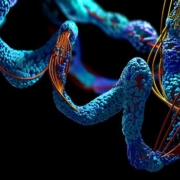A study published in Nature Communications describes how researchers at the United Kingdom Research Institute at the University of Cambridge stumbled upon a potential target of dementia research.
Obesity may weaken vaccine protection; unvaccinated Omicron patients face risk from variants
AstraZeneca, BNT162b2 (Pfizer and BioNTech), Body Mass Index (BMI), CoronaVac (Sinovac Biotech), COVID-19 immunity, COVID-19 Studies, COVID-19 Vaccinations, COVID-19 Vaccines, Covid-19 Variants, Hospitalized COVID-19 Patients, Immune System, Janssen COVID-19 Vaccine (J&J), Johnson & Johnson, Medical Journals, Messenger RNA (mRNA) Vaccines, mRNA-1273/Moderna COVID-19 Vaccine (Moderna), Nature, Nature Communications, Obesity, Omicron (B.1.1.529) (South Africa), R&D, SARS-CoV-2 virus, Sinovac, South Africa, TurkeySevere obesity may weaken the effectiveness of COVID-19 vaccines in those who have never been infected with the coronavirus, according to a small Turkish study. Additionally, South African researchers have found infection with the Omicron variant of the coronavirus can significantly improve the immune system’s ability to protect against other variants, but only in people who have been vaccinated.
About 35% of People Who Received Placebo in Vaccine Trials Report Side Effects and More COVID-19 News
Adverse Events, BNT162b2 (Pfizer and BioNTech), Business, CDC, Clinical Trials, COVID-19 Antibodies, COVID-19 forecasts, COVID-19 Studies, COVID-19 Vaccines, Harvard Medical School, Intensive Care Units (ICUs), JAMA, Janssen COVID-19 Vaccine (J&J), Johnson & Johnson, Long COVID, mRNA-1273/Moderna COVID-19 Vaccine (Moderna), Nature Communications, Omicron (B.1.1.529) (South Africa), Placebo, R&D, Side Effects, The NetherlandsAccording to a recent study conducted by researchers at Harvard Medical School and Beth Israel Deaconess Medical Center, 76 percent of the adverse side effects (such as fatigue or headache) that people experienced after receiving their first COVID-19 vaccination were also reported by participants who received a placebo shot.
Severe COVID-19 may trigger autoimmune conditions; New variants cause more virus in the air
Antibodies, Autoimmune Conditions, Cancer, Clinical Trials, Covid-19 Airborne Transmission, COVID-19 Vaccines, Covid-19 Variants, Immune System, Inflammatory Diseases, Nature Communications, Papers, R&D, Researchers, Severe Covid-19, TissueSevere Covid-19 may trick the immune system into producing so-called autoantibodies that have the potential to eventually attack healthy tissue and cause inflammatory diseases, researchers warned in a paper published in Nature Communications. Another study suggests that the virus that causes Covid-19 may be getting better at traveling into the air
Research Roundup: Link Between Herpes Simplex Virus and Neurogenerative Diseases Gets More Support
Alzheimer’s disease, Clinical Trials, COVID-19 booster shots, Dementia, Herpes Simplex Virus, Medical Journals, Molecules, Multiple Sclerosis, Myelin, Nature Communications, Neurogenerative diseases, Peptides, Proteins, R&D, Rice University, The Lancet, University of Houston, University of Illinois at ChicagoResearchers at the University of Illinois at Chicago published what they are calling a “first of its kind study” that found a possible direct link between neurodegenerative diseases and the herpesvirus.
A study published in Nature Communications reveals that patients who had been hospitalized with severe Covid-19 might not be totally safe after recovery, as they are more likely to harbor self-attacking antibodies than those who did not have the virus.
A study found potential in a novel gene therapy method to help children born with a rare genetic and neurodegenerative disorder, AADC deficiency.
Researchers at Massachusetts General Hospital developed an artificial intelligence (AI) that quickly identifies drugs currently available that might treat Alzheimer’s disease.
Single-patient study adds to debate over Gilead’s remdesivir for Covid-19
Antivirals, Azithromycin, Clinical Trials, Coronavirus Disease (COVID-19) Pandemic, COVID-19 Studies, Doctors, Hydroxychloroquine, Medical Journals, Nature Communications, R&D, Remdesivir, Scientists, Survival Rates, World Health OrganizationA single-patient study conducted by British scientists found that Gilead’s remdesivir could be highly effective against Covid-19, raising questions about previous studies that found the antiviral drug had no impact on death rates from the disease.
According to a study published in Nature Communications, enzymes that are used by bacteria to break down mucus in the gut can potentially be useful biomarkers for intestinal diseases.










